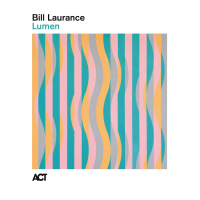Home » Jazz Articles » Bailey's Bundles » The Blues According To Rory Block
The Blues According To Rory Block

Courtesy Ward Photography

Rory Block
guitar and vocalsBlock grew up hanging out with musicians like
John Sebastian
harmonica
Stefan Grossman
b.1945
Skip James
guitar, acoustic1902 - 1969

Mississippi John Hurt
guitar, acoustic1892 - 1966
In Berkeley, Block developed her slide guitar technique, using a wrench socket as her slide, just as Little Feat founder

Lowell George
guitar, slideAfter having documented the rural delta blues of Mississippi and Arkansas throughout her recording career, Block consolidated her position in 2006 with her Rykodisc release, The Lady And Mr. Johnson, an inventive and inspired collection of 13

Robert Johnson
vocals1911 - 1938

Mississippi Fred McDowell
guitar, slide1904 - 1972
Reverend Gary Davis
guitar, acoustic1896 - 1972

Mississippi John Hurt
guitar, acoustic1892 - 1966

Skip James
guitar, acoustic1902 - 1969

Bukka White
guitar, slide1906 - 1977
In 2018, Block released A Woman's Soul: A Tribute To Bessie Smith (Stony Plain Records) as the beginning of her "Power Women Of The Blues" series. The next releases in this new series, Prove It On Me (Stony Plain Records, 2020) and Ain't Nobody Worried: Celebrating Great Women Of Song (Stony Plain, 2022) differed from the Bessie Smith release by including the music of multiple women musicians rather than a single one. The Lady And Mr. Johnson and A Woman's Soul: A Tribute To Bessie Smith, are stylistically more similar to Block's "Mentor Series" than not and deserve to be included in this consideration of the singer's profoundly realized blues expertise.
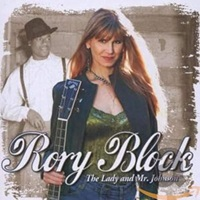 Rory Block
Rory Block The Lady And Mr. Johnson
Rykodisc
2006
"Baby, I don't care where you bury my body when I'm dead and gone... "
Rory Block's The Lady And Mr. Johnson became a part of a larger body of tributes to the blues singer, beginning with the

Peter Green
guitar, electric
John Hammond Jr.
guitar, acoustic
Eric Clapton
guitar and vocalsb.1945
That being said, Block does like to add her own touch. On the opening "Cross Road Blues," Block adds a dirty gospel introduction with choir (her own voice re-dubbed) before playing the familiar slide-propelled opening. Her guitar playing is exacting and vocals gritty and harsh as necessary. Block adds a thin, sinewy slide introduction to "The Last Fair Deal Gone Down" that both stresses the modern sonics of the recording and frames the timeless grit in her vocal delivery. Block chooses "Terraplane Blues" over "Traveling Riverside Blues" to cover Johnson's most sexual songs, which she does with a beautifully salacious wink. The singer makes a tryptic of Johnson's starkest songs, "Come In My Kitchen," "Hellhound On My Trail," and "If I had Possession Over Judgement Day," hinting less of loss and damnation than a glimmer of redemption. Block turns Johnson on his ear while playing him straight.
Key Selection: "Come In My Kitchen."
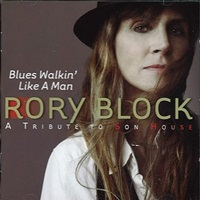 Rory Block
Rory Block Blues Walkin' Like a Man: A Tribute to Son House
Stoney Plain
2008
"I'm gonna be a Baptist preacher, and I sure won't have to work,,, "

Son House
guitar, slide1902 - 1988
Tommy Johnson
tuba1935 - 2006
Willie Brown
b.1900Block met House in the company of guitarist Stefan Grossman in New York City in 1965. Her memories were vivid, particularly of the forceful way House played guitar, more percussively than melodically. Block describes House thusly,
"Robert Johnson is the celestial note wafting from the highest tower. Son House is the boulder upon which the Cathedral was built. He was so stark, so intense, driving and raw, and always slamming, snapping, and torturing the guitar."
Block takes a more refined path to House's music, using her carefully crafted guitar playing to temper House's violent performance tendencies. She keeps House' relentless sense of rhythm while emphasizing the delicacy of the slide guitar (more than House did). Block makes perfect sense of House'y restless guitar work on the 1930 recordings "My Black Mama, Part 1" and "Preachin' The Blues." In the same way she treated Johnson's "Crossroad Blues on The Lady And Mr. Johnson, Block transforms "Dry Spell Blues, Part 2" into a gospel hoedown. Rather than "John The Revelator," Block chose "Grinnin' In Your Face" for the a cappella selection from House's book. The singer immediately fixes the gravity of the song with a guttural slur, focusing on her personal experience with House's. Block strikes the vein of the blues on this recording.
Key Selection: "Dry Spell Blues. Part 2."
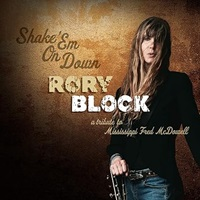 Rory Block
Rory Block Shake 'Em on Down: A Tribute to Mississippi Fred McDowell
Stoney Plain
2011
..."and I do not play no rock n' roll, ya'll. I just play the straight nat'ral blues..."
And so

Mississippi Fred McDowell
guitar, slide1904 - 1972
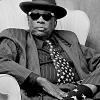
John Lee Hooker
guitar1917 - 2001
Block performs songs from throughout McDowell's book. She covers McDowell's versions
Scrapper Blackwell
guitar, acoustic1903 - 1962

Bukka White
guitar, slide1906 - 1977

Paul Simon
composer / conductorb.1941
Ladysmith Black Mambazo
band / ensemble / orchestra
Bonnie Raitt
guitar and vocalsb.1949
Key Selection: "Ancestral Home."
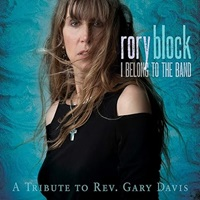 Rory Block
Rory Block I Belong to the Band: A Tribute to Rev. Gary Davis
Stoney Plane
2012
"One of these days about twelve o'clock / This old world's going to reel and rock / I belong to the band, Hallelu..."
If Rory Block occasionally shaded her previous performances considered here with gospel, she goes all-out Holy Ghost on I Belong to the Band: A Tribute to Rev. Gary Davis. The Rev.
Reverend Gary Davis
guitar, acoustic1896 - 1972
Block treats us to the best of Gary Davis' religious material. She assaults "Samson & Delilah" with the fervor of the newly converted, singing from every corner of her vocal range, much as Davis often did. This is the way to open an album! The singer brings in the choir early for a spirited "Goin' To Sit Down On The Banks Of The River" preaching to the revival patrons. Block breaks out her slide for "I Belong To The Band" summoning the Holy Spirit with a ragtime breakdown featuring again the choir. Block extrapolates this same recipe to Davis' touchstone, "Pure Religion." Conversational with the lyrics, Block and her socket slide preach the gospel of inclusion and participation as part of the bargain of having this rarefied community. The singer and choir intertwine the blues and the sacred on "Twelve Gates To The City," showcasing why the two are forever joined. Block closes the album with Davis' greatest contribution to all music to come later, "Death Don't Have No Mercy." While this is not Block's best playing style, she makes an argument for her version here to be comparable or superior to similar performances by
Jorma Kaukonen
guitar and vocals
Grateful Dead
band / ensemble / orchestrab.1965
Key Selection: "I Belong To The Band."
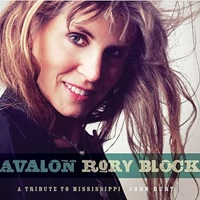 Rory Block
Rory Block Avalon: A Tribute to Mississippi John Hurt
Stoney Plain
2013
"Let me see this Albert dying / He's my man and he done me wrong..."
While John Smith Hurt ("Mississippi" John Hurt) is often classified as a country blues singer, his song style differs dramatically from other delta blues musicians like Charley Patton, Son House, Tommy Johnson, and, even Skip James in that he sang to an intricate fingerpicking, syncopated style that has more in common with the Piedmont blues than the Mississippi Delta Blues. Additionally, he was considered more of a "songster," a tradition that both pre-dated and co-existed with blues music. Songsters typically performed a wide variety of folk songs, ballads, dance tunes, reels and minstrel songs, in addition to the occasional blues tune. Hurt's repertoire reflected this. Block met Hurt during the same compressed time in the 1960s when she met Son House, Fred McDowell, and Rev. Gary Davis, all in company with her then boyfriend, Stefan Grossman.
Hurt was born in Teoc, MS, and grew up in Avalon, a locale that looms large in his music and memory, where he sang in his "Avalon Blues," "Avalon, my hometown, always on my mind / Avalon, my hometown." Like in her Gary Davis tribute, Hurt's performance style was not squarely in Block's focus. Yet, she readily makes these songs her own while paying homage to the artist.
While it is apparent that Block has enjoyed recording this series, she took incandescent glee in making her homage to Hurt. One can hear this mirth in every growl, groan, falsetto howl, and chuckle Block sings. She is wholesomely lascivious on Hurt's more bawdy material ("Candy Man"). When addressing a lover as in "Avalon," "Frankie & Albert," and "Make Me A Pallet On The Floor," Block expresses an organic sensuality that understands these old lyrics intimately, the good and bad love stories each. She plays the saucy coquette on "Richland Woman's Blues." In all cases where she, as protagonist, tells a lover goodbye, she does so with a carnally palpable pleasure.
Block's guitar practice is worth mentioning. On most of the songs, the guitarist overlays her superb slide guitar on Hurt's syncopated ragtime picking. She does this gently as on "Avalon" or with great abruptness as on "Louis Collins." She couples the two guitar styles with a now familiar choir she likes to use when easing a slice of religion or South African soul into a song as she did brilliantly on "Pay Day," the most entertaining song on the recording. Rory Block proves herself a supreme interpreter of all blues styles on this recording and that is saying a lot.
Key Selection: "Pay Day."
 Rory Block
Rory Block Hard Luck Child: A Tribute to Skip James
Stoney Plain
2014
"I'd rather be the devil than to be that woman's man..."
Nehemiah Curtis "Skip" James is the delta blues outlier. He played a flavor of blues that was so unlike his contemporaries, Charlie Patton, Son House, and Robert Johnson. James' music has been called "wonderfully strange" and "Weird." Often called the "Bentonia School" of blues playing, after James' south delta home the style is characterized by a shared repertoire of songs, guitar tunings (James used a D minor tuning [DADFAD]) and chord-voicings giving the "School" with a distinctively minor tonality not common to other styles of blues music. Mercurial and enigmatic, nature blessed James with a high, eerie voice, one terrifying as it is tender. James was not the only practitioner of this school of music.
Jack Owens
b.1904
Jimmy "Duck" Holmes
guitarb.1947
Rory Block met James in the mid-1960, with Stefan Grossman, though she admits in her autobiography, When A Woman Gets The Blues: (Create Space, 2011), she does not recall this meeting. Instead, she remembers visiting James in the hospital in Philadelphia as he was dying of cancer in 1969. The subtitle "Hard Luck Child" emerges from this late image of James to a teenaged Block as much from James' Paramount release of the same. James' music is so unique and idiosyncratic that successful interpretations are rare. Block fares better than most. Unlike her studied and historically relevant playing of Robert Johnson on The Lady And Mr. Johnson, the guitarist straightens out James' often roaming performance style, overlaying it liberally with her own slide guitar. Block does not sound as comfortable here as she does on Avalon: A Tribute to Mississippi John Hurt, but that in no way means she missed any mark. James' music was not full of fun and Block sings it like the serious matter it is.
The prime points of Hard Luck Child are many: "Special Rider Blues" and "Cypress Grove Blues," both from James' 1931 Paramount Sides, provide Block and listeners a warm-up. Block's guitar playing is robust and her singing full-throated. She is in full command of this material as it is filtered through her own experience. On James' masterpieces, "Devil Got My Woman" and "Hard Times Killing Floor Blues" Block is determined and respectful. She hits her stride on "Jesus Is A Mighty Good Leader" where she supplies The Holy Spirit through her providing her own choir, as on the previous recordings. Except here, Block is approaching an emotional crescendo through the committed fervor of her performance. "I'm So Glad" is a potent blend of James' manic delivery, Cream's courageous cover, and Block's dedication to the craft. Block is approaching a musical singularity in this series.
Key Selection: "I'm So Glad."
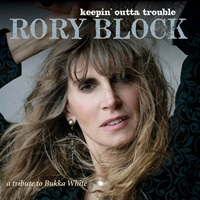 Rory Block
Rory Block Keepin' Outta Trouble: A Tribute to Bukka White
Stoney Plain
2006
"That Frisco Train done stole my jelly roll... "
With the music of Booker T. Washington "Bukka" White, Rory Block finds her optimal comfort zone. Block met the singer during the same period she met the other artist in her "Mentor Series." She remembered only White's potent and robust aura and she translates this memory and method into the three originals and seven White covers on Keepin' Outta Trouble: A Tribute to Bukka White. In comparison with the other artists in the Mentor Series, one might ask who Bukka White is. Do you remember the song "Shake 'em On Down" from the Mississippi Fred McDowell tribute? White composed it. After recording a handful of sides for Victor, Vocalian, and Okeh between 1930 and 1937, authorities convicted him of murder and sentenced him to life at Parchman Farm. He was released two years later and returned to recording, expressing his experiences in prison in "Parchman Farm Blues" and "District Attorney Blues" released in 1940.
White was one of the few blues guitarists to use a cross-note tuning in E minor (in the same manner that Skip James used an open D minor tuning—a step down from E minor). But, instead of using James' intricate fingerpicking, White recalls Son House's driving rhythm to propel his songs. It is here that Rory Block reaches the interpretive zenith in her Mentor Series. She is locked into her comfort zone, delivering a relaxed and integrated survey of White's songbook. Before reaching the canon, Block provides the most effective of her original compositions dedicated to the artists. "Bukka's Day" is Block's account of White's professional life full of music, murder, redemption and perseverance. She sings this over a driving riff, harmonically simple, featuring Blocks striking slide guitar. It is her best integrated effort in original composition for the series.
On White's "Aberdeen Mississippi Blues" (White's answer to Mississippi John Hurt's "Avalon Blues") Block continues to draw from White's harmonically spare songs a universe of experience easily shared. Block presents her vocal asides easily with sensuousness and humor. The singer presents her voice multiplexed to the greatest effect on "Panama Limited" singing with conviction and dark humor. Block outdoes herself on "New Frisco Train" singing with all the laconic bawdiness she has been leading up to throughout this series. It is obvious that she is having fun singing this and the other songs of Bukka White. If Rory Block did nothing else, this would cement her solid blues bona fides.
Key Selection: "New Frisco Train."
 Rory Block
Rory Block A Woman's Soul: A Tribute to Bessie Smith
Stoney Plain
2018
"I'm not tryin' to make you feel blue / I'm not satisfied with the way that you do I've got to help you find somebody to / Do your duty!" After her tributes to the blues patricians of the Mentor Series, Rory Block comes firmly into her own when beginning her "Power Women Of The Blues" series with a complete recording dedicated to the Empress of the Blues,

Bessie Smith
vocals1894 - 1937
Block brings innovation to this set by translating the scratching piano and small combo accompaniment divined from 100-year-old shellac 78s to the precisely expressed slide-guitar style most closely aligned with

Ry Cooder
guitarb.1947
Key Selection: "Empty Bed Blues."
Tags
Comments
PREVIOUS / NEXT
Support All About Jazz
 All About Jazz has been a pillar of jazz since 1995, championing it as an art form and, more importantly, supporting the musicians who make it. Our enduring commitment has made "AAJ" one of the most culturally important websites of its kind, read by hundreds of thousands of fans, musicians and industry figures every month.
All About Jazz has been a pillar of jazz since 1995, championing it as an art form and, more importantly, supporting the musicians who make it. Our enduring commitment has made "AAJ" one of the most culturally important websites of its kind, read by hundreds of thousands of fans, musicians and industry figures every month.
Go Ad Free!
To maintain our platform while developing new means to foster jazz discovery and connectivity, we need your help. You can become a sustaining member for as little as $20 and in return, we'll immediately hide those pesky ads plus provide access to future articles for a full year. This winning combination vastly improves your AAJ experience and allow us to vigorously build on the pioneering work we first started in 1995. So enjoy an ad-free AAJ experience and help us remain a positive beacon for jazz by making a donation today.

Syracuse
Concert Guide | Venue Guide | Local Businesses
| More...






 Buy Now
Buy Now






